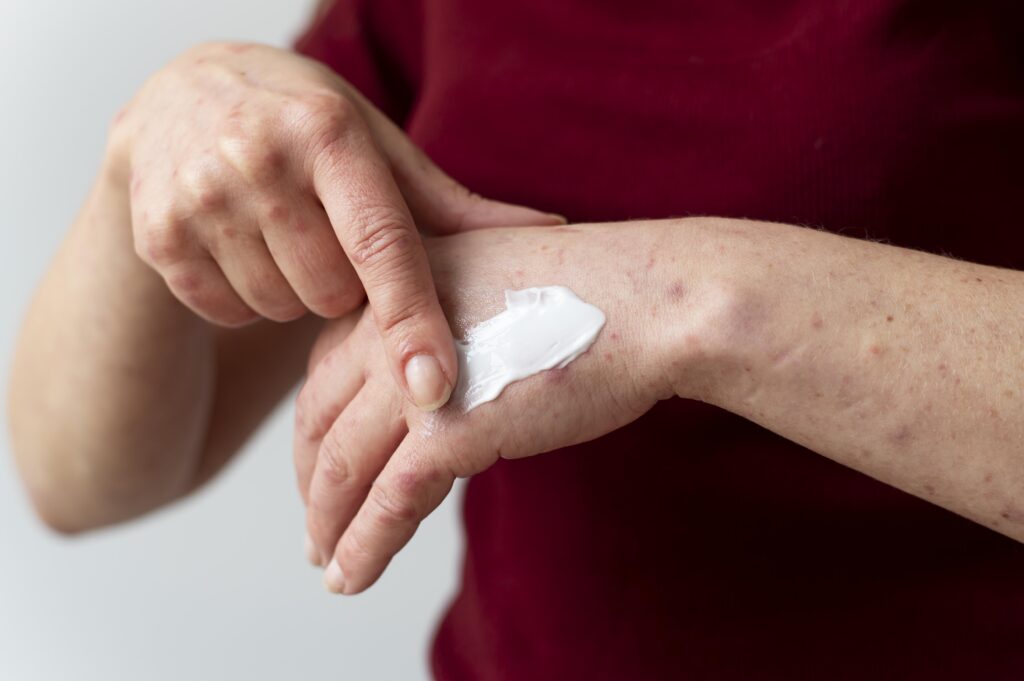- drambalkar@yahoo.co.in
- Mon - Sunday 10:00 AM - 02:00 PM
6 Tips for Psoriasis Skin Care
Psoriasis is a chronic skin condition that causes skin cells to multiply rapidly, resulting in the formation of itchy, dry, and often painful patches of skin. While there is no cure for psoriasis, there are several strategies you can use to manage and improve the condition of your skin.

Here are five tips for psoriasis skin care:
Keep Your Skin Moisturized:
One of the simplest and most effective ways to soothe irritated skin is through proper moisturization. It can significantly aid in the healing process and alleviate issues like dryness, itching, redness, soreness, and scaling.
Your choice of moisturizer should align with the level of dryness your skin experiences. Ointments are thick and dense, effectively trapping moisture. Lotions, on the other hand, are thinner and absorb quickly. Creams offer a middle ground. It’s important to note that an effective moisturizer need not be expensive; focus on finding one that is fragrance-free.
After bathing or showering, it’s ideal to gently apply the moisturizer to your skin. Reapplication throughout the day, especially when changing clothes, is beneficial. This practice is particularly crucial during cold or dry weather conditions.
Another effective method to maintain skin moisture is by using a humidifier in your living space, particularly when the air tends to be hot and dry. If you have indoor heating, using a humidifier can assist your skin in retaining moisture more effectively.
Avoid Irritating Substances:
Skin that is prone to psoriasis can often react negatively to various ingredients commonly found in soaps, lotions, and cosmetics. To care for such delicate skin, it’s advisable to choose products that prioritize gentleness and are free of fragrances. Look for items explicitly designed for sensitive or psoriasis-prone skin, as these are tailored to provide relief and minimize irritation.
Steer clear of products that contain alcohol, perfumes, or harsh chemicals, as these can exacerbate the already sensitive nature of psoriasis-prone skin. Opting for milder, hypoallergenic alternatives can help maintain the health and comfort of your skin while reducing the risk of triggering psoriasis flare-ups.
Take Short, Lukewarm Baths:
Long, hot showers or baths can strip your skin of natural oils and worsen psoriasis symptoms. Instead, take short, lukewarm baths or showers to avoid excessive drying of your skin. You can also add colloidal oatmeal or Epsom salts to your bathwater to help soothe itching and inflammation.
Avoid Scratching or Picking:
Scratching or picking at psoriasis plaques can cause them to bleed and become more inflamed. Try to resist the urge to scratch, and keep your nails short to minimize damage to your skin. If itching is a significant issue, talk to your healthcare provider about appropriate over-the-counter or prescription medications to manage it.
Sun Exposure and UV Therapy:
Controlled exposure to natural sunlight or ultraviolet (UV) therapy under medical supervision can help improve psoriasis symptoms for some people. However, it’s essential to be cautious and protect your skin from sunburn. Always wear sunscreen and limit your sun exposure to avoid overdoing it.
Stop Smoking and Limit Alcohol
Smoking has the potential to induce psoriasis flare-ups, and it’s advisable to consult your healthcare provider to determine the most suitable method for quitting. It’s worth noting that, in some cases, the use of nicotine patches may exacerbate psoriasis symptoms.
Additionally, excessive alcohol consumption can also act as a trigger for psoriasis symptoms and may pose risks when combined with certain psoriasis medications. If you choose to consume alcohol, it’s advisable to do so in moderation, which typically means limiting intake to one drink per day for women and up to two drinks for men.
In addition to these general tips, it’s crucial to work closely with your dermatologist or healthcare provider to develop a personalized psoriasis management plan. They can prescribe topical treatments, oral medications, or biologics, depending on the severity of your condition. Lifestyle factors such as stress management, a balanced diet, and regular exercise can also contribute to overall skin health and psoriasis management.
Conclusion
Effective psoriasis skin care involves moisturizing, avoiding irritants, taking short baths, and refraining from scratching. Controlled sun exposure and UV therapy can help. Quitting smoking and limiting alcohol intake are essential. Collaborating with healthcare professionals for a personalized treatment plan is key to managing psoriasis and improving skin health.

Get in Touch with us Today to Begin Your Journey of Transformation

Contact Us
- Dr.Ambalkars Aayurvedic Research Centre, ARC Bhavan, Vijay Vihar Complex, Evershine City, Last Stop, Vasai (E)
- drambalkar@yahoo.co.in
- +91 9320193201
- +91 9766362776

